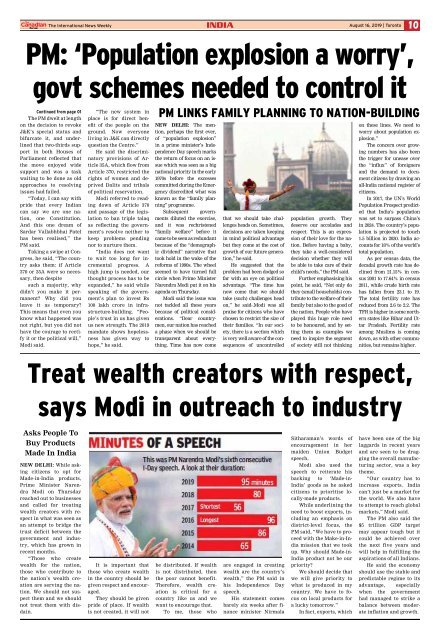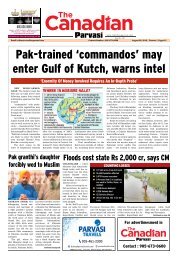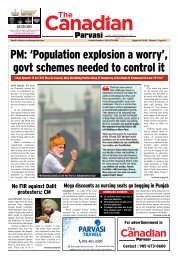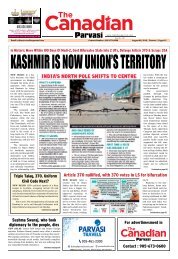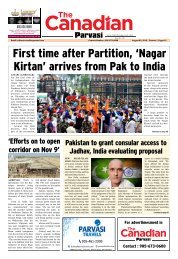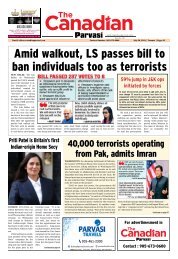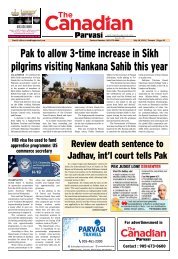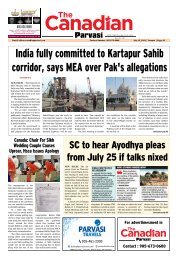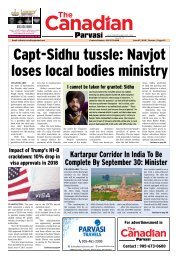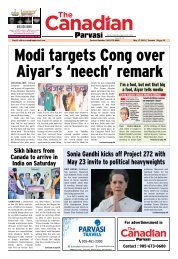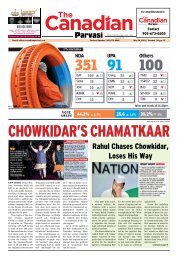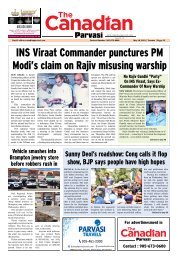You also want an ePaper? Increase the reach of your titles
YUMPU automatically turns print PDFs into web optimized ePapers that Google loves.
<strong>The</strong> International News Weekly INDIA<br />
August 16, 2019 | Toronto 10<br />
PM: ‘Population explosion a worry’,<br />
govt schemes needed to control it<br />
Continued from page 01<br />
<strong>The</strong> PM dwelt at length<br />
on the decision to revoke<br />
J&K’s special status and<br />
bifurcate it, and underlined<br />
that two-thirds support<br />
in both Houses of<br />
Parliament reflected that<br />
the move enjoyed wide<br />
support and was a task<br />
waiting to be done as old<br />
approaches to resolving<br />
issues had failed.<br />
“Today, I can say with<br />
pride that every Indian<br />
can say we are one nation,<br />
one Constitution.<br />
And this one dream of<br />
Sardar Vallabhbhai Patel<br />
has been realised,” the<br />
PM said.<br />
Taking a swipe at Congress,<br />
he said, “<strong>The</strong> country<br />
asks them: if Article<br />
370 or 35A were so necessary,<br />
then despite<br />
such a majority, why<br />
didn’t you make it permanent?<br />
Why did you<br />
leave it as temporary?<br />
This means that even you<br />
know what happened was<br />
not right, but you did not<br />
have the courage to rectify<br />
it or the political will,”<br />
Modi said.<br />
“<strong>The</strong> new system in<br />
place is for direct benefit<br />
of the people on the<br />
ground. Now everyone<br />
living in J&K can directly<br />
question the Centre.”<br />
He said the discriminatory<br />
provisions of Article<br />
35A, which flow from<br />
Article 370, restricted the<br />
rights of women and deprived<br />
Dalits and tribals<br />
of political reservation.<br />
Modi referred to reading<br />
down of Article 370<br />
and passage of the legislation<br />
to ban triple talaq<br />
as reflecting the government’s<br />
resolve neither to<br />
keep problems pending<br />
nor to nurture them.<br />
“India does not want<br />
to wait too long for incremental<br />
progress. A<br />
high jump is needed, our<br />
thought process has to be<br />
expanded,” he said while<br />
speaking of the government’s<br />
plan to invest Rs<br />
100 lakh crore in infrastructure-building.<br />
“People’s<br />
trust in us has given<br />
us new strength. <strong>The</strong> 2019<br />
mandate shows hopelessness<br />
has given way to<br />
hope,” he said.<br />
PM Links Family Planning To Nation-Building<br />
New Delhi: <strong>The</strong> mention,<br />
perhaps the first ever,<br />
of “population explosion”<br />
in a prime minister’s Independence<br />
Day speech marks<br />
the return of focus on an issue<br />
which was seen as a big<br />
national priority in the early<br />
1970s before the excesses<br />
committed during the Emergency<br />
discredited what was<br />
known as the “family planning”<br />
programme.<br />
Subsequent governments<br />
diluted the exercise,<br />
and it was rechristened<br />
“family welfare” before it<br />
came to be seen as redundant<br />
because of the “demographic<br />
dividend” narrative that<br />
took hold in the wake of the<br />
reforms of 1990s. <strong>The</strong> wheel<br />
seemed to have turned full<br />
circle when Prime Minister<br />
Narendra Modi put it on his<br />
agenda on Thursday.<br />
Modi said the issue was<br />
not tackled all these years<br />
because of political considerations.<br />
“Dear countrymen,<br />
our nation has reached<br />
a phase when we should be<br />
transparent about everything.<br />
Time has now come<br />
that we should take challenges<br />
heads on. Sometimes,<br />
decisions are taken keeping<br />
in mind political advantage<br />
but they come at the cost of<br />
growth of our future generation,”<br />
he said.<br />
He suggested that the<br />
problem had been dodged so<br />
far with an eye on political<br />
advantage. “<strong>The</strong> time has<br />
now come that we should<br />
take (such) challenges head<br />
on,” he said-.Modi was all<br />
praise for citizens who have<br />
chosen to restrict the size of<br />
their families. “In our society,<br />
there is a section which<br />
is very well aware of the consequences<br />
of uncontrolled<br />
population growth. <strong>The</strong>y<br />
deserve our accolades and<br />
respect. This is an expression<br />
of their love for the nation.<br />
Before having a baby,<br />
they take a well-considered<br />
decision whether they will<br />
be able to take care of their<br />
child’s needs,” the PM said.<br />
Further emphasising his<br />
point, he said, “Not only do<br />
they (small households) contribute<br />
to the welfare of their<br />
family but also to the good of<br />
the nation. People who have<br />
played this huge role need<br />
to be honoured, and by setting<br />
them as examples we<br />
need to inspire the segment<br />
of society still not thinking<br />
on these lines. We need to<br />
worry about population explosion.”<br />
<strong>The</strong> concern over growing<br />
numbers has also been<br />
the trigger for unease over<br />
the “influx” of foreigners<br />
and the demand to document<br />
citizens by drawing an<br />
all-India national register of<br />
citizens.<br />
In 2017, the UN’s World<br />
Population Prospect predicted<br />
that India’s population<br />
was set to surpass China’s<br />
in 2024. <strong>The</strong> country’s population<br />
is projected to touch<br />
1.5 billion in 2030. India accounts<br />
for 18% of the world’s<br />
total population.<br />
As per census data, the<br />
decadal growth rate has declined<br />
from 21.15% in census<br />
2001 to 17.64% in census<br />
2011, while crude birth rate<br />
has fallen from 23.1 to 19.<br />
<strong>The</strong> total fertility rate has<br />
reduced from 2.6 to 2.2. <strong>The</strong><br />
TFR is higher in some northern<br />
states like Bihar and Uttar<br />
Pradesh. Fertility rate<br />
among Muslims is coming<br />
down, as with other communities,<br />
but remains higher.<br />
Treat wealth creators with respect,<br />
says Modi in outreach to industry<br />
Asks People To<br />
Buy Products<br />
Made In India<br />
New Delhi: While asking<br />
citizens to opt for<br />
Made-in-India products,<br />
Prime Minister Narendra<br />
Modi on Thursday<br />
reached out to businesses<br />
and called for treating<br />
wealth creators with respect<br />
in what was seen as<br />
an attempt to bridge the<br />
trust deficit between the<br />
government and industry,<br />
which has grown in<br />
recent months.<br />
“Those who create<br />
wealth for the nation,<br />
those who contribute to<br />
the nation’s wealth creation<br />
are serving the nation.<br />
We should not suspect<br />
them and we should<br />
not treat them with disdain.<br />
It is important that<br />
those who create wealth<br />
in the country should be<br />
given respect and encouraged.<br />
<strong>The</strong>y should be given<br />
pride of place. If wealth<br />
is not created, it will not<br />
be distributed. If wealth<br />
is not distributed, then<br />
the poor cannot benefit.<br />
<strong>The</strong>refore, wealth creation<br />
is critical for a<br />
country like us and we<br />
want to encourage that.<br />
To me, those who<br />
are engaged in creating<br />
wealth are the country’s<br />
wealth,” the PM said in<br />
his Independence Day<br />
speech.<br />
His statement comes<br />
barely six weeks after finance<br />
minister Nirmala<br />
Sitharaman’s words of<br />
encouragement in her<br />
maiden Union Budget<br />
speech.<br />
Modi also used the<br />
speech to reiterate his<br />
backing to ‘Made-in-<br />
India’ goods as he asked<br />
citizens to prioritise locally-made<br />
products.<br />
While underlining the<br />
need to boost exports, including<br />
an emphasis on<br />
district-level focus, the<br />
PM said, “We have to proceed<br />
with the Make-in-India<br />
mission that we took<br />
up. Why should Made-in-<br />
India product not be our<br />
priority?<br />
We should decide that<br />
we will give priority to<br />
what is produced in my<br />
country. We have to focus<br />
on local products for<br />
a lucky tomorrow.”<br />
In fact, exports, which<br />
have been one of the big<br />
laggards in recent years<br />
and are seen to be dragging<br />
the overall manufacturing<br />
sector, was a key<br />
theme.<br />
“Our country has to<br />
increase exports. India<br />
can’t just be a market for<br />
the world. We also have<br />
to attempt to reach global<br />
markets,” Modi said.<br />
<strong>The</strong> PM also said the<br />
$5 trillion GDP target<br />
may appear tough but it<br />
could be achieved over<br />
the next five years and<br />
will help in fulfilling the<br />
aspirations of all Indians.<br />
He said the economy<br />
should use the stable and<br />
predictable regime to its<br />
advantage, especially<br />
when the government<br />
had managed to strike a<br />
balance between moderate<br />
inflation and growth.


